Bonsoir, Atlantis is an island that would have been engulfed during the Protohistory of Greece and Eastern Europe. It is evoked by Plato in two dialogues, Timaeus then the Critias

Atlantis finally found after 12 000 years ...?
Or is hiding, and where is Atlantis ...?
Not sharpening the debate, some scientists consider that Plato's account may be partially true. In the sixth century, Proclus interpreted the philosopher's text as a mixture of historical facts and philosophical allegory. He relied on a treatise on geography which confirmed Plato's version by demonstrating the existence of an archipelago off the columns of Hercules (the present Strait of Gibraltar).
Great expeditions.
Today, some specialists do not completely exclude this hypothesis: arguments in support, they envisage that there can be a real nucleus in the myth. Crossing texts and archaeological, geological and historical data, their calculations resulted in numerous expeditions: from the Atlas to the Strait of Gibraltar through the poles, the explorers sought Atlantis in the four corners of the world.
The main destinations ...
Atlantis has been the subject of speculation and research around the world, based on hypotheses more or less based, and six destinations have been privileged to try its location, see map above:
- The Antarctic South Pole: The Antarctic Ocean is the "real ocean" evoked by Plato.
- The region of the Nordic countries: The Atlanteans have been associated with the warrior peoples of northern Europe.
- The Atlantic Ocean: Atlantis would be a continent disappeared in the middle of the ocean.
- The Mediterranean, more particularly Cyprus and Crete
- The surroundings of the Strait of Gibraltar: Plato places Atlantis off the "columns of Hercules" (current Gibraltar).
- The North African Atlas: Generally sought after at the bottom of the sea, the Atlanteans were also assimilated to the inhabitants of the Libyan region.

Map drawn by Piri Reis in 1513
Two contemporary Canadian researchers, Rand and Rose Flem-Ath, place Atlantis in Antarctica. Based on the Piri Reis map, they found that looking at the globe from the South Pole, all the oceans seemed to belong to one and the same group, the "true ocean" evoked by Plato.
In the middle, center of the world, is the Antarctic, or possibly Atlantis. The Atlanteans, who would have anticipated the cataclysm, would have taken refuge on the lands at altitude, spared by the tidal wave: the Cordillera of the Andes, the plateaus of Thailand and Ethiopia.
Nordic Atlantis, a thesis oriented:
Strabo, a Greek geographer of the early Christian era, was the first to speak of a northern Atlantis: he established a link between the conquests of the northern peoples (Celts, Cimbres and Teutons who threatened the Greeks and Romans In the 6th century BC) and the Atlantean conquests.
At the beginning of the 20th century, the German pastor Jürgen Spanuth resumed his theories for racist purposes. According to him, the Celts and Germans, or "peoples of the North Sea", were none other than the descendants of the Atlanteans whom he called the "original people." He describes this civilization as closed, rooted in its native land and hermetic to external influences. These peoples whom he claims to be superior, according to him, are pure because they are not mixed.
Columbus discovers Atlantis:

Map of Atlantis in the middle of the Atlantic Ocean
In the fifteenth century, the discovery of America by Christopher Columbus launched the theory of an Atlantic Atlantis. In a text of 1525, the conquistador Ovidio maintains that Columbus discovered America by seeking, in the middle of the Atlantic Ocean, the Hesperides, a garden of delights sometimes associated with Atlantis.
The drift of the continent:
In the nineteenth century, it was the similarities between Egyptian and pre-Columbian societies which reiterated the hypothesis that a continent would have occupied virtually the entire Atlantic Ocean. In 1925, English Spence, which is based on the geological knowledge of the time, deepens this idea.
It shows that Atlantis would have dislocated with time and natural disasters. The drift of the continents would have divided it between the East (Africa) and the West (Central and South America). The Atlanteans then emigrated to these areas. Spence explains the resemblance between Egyptian and Andean architecture.
The return to the columns of Hercules.
Submersion of the Strait:
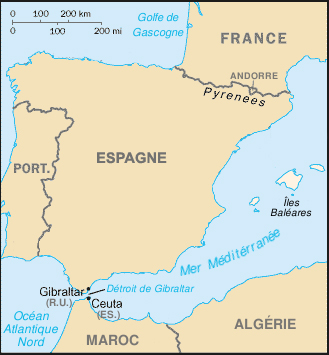
The Strait of Gibraltar and the 2 columns of Hercules.
Very recently, a French geologist, J. Collina-Girard, exploited the trail raised by Plato which explicitly writes that Atlantis is "in front of the Hercules columns" (Straits of Gibraltar). Its current configuration is the legacy of global warming following the last glaciation: water has risen 135 m in 15 000 years, submerging the continental shelves between 19 000 and 4 000 years BC. J.C.
Chance or coincidence?
A part of the landscape has disappeared under the sea. An island, 14 km long and 5 km wide, was discovered in the seabed northwest of Cape Spartel (in Tangier, Morocco), Less than 10 km from the coasts. It is probable that it was occupied by the Palaeolithic populations whose presence was attested on the Moroccan, Spanish and Portuguese coastlines. Geology thus proves that an island was engulfed at the time and place evoked by Plato. But does the geological reality refer to the truth set forth by the philosopher? Is this coincidence enough to prove the truth of the myth? J. Collina-Girard did not take a position.
Des Atlantes in the Atlas:
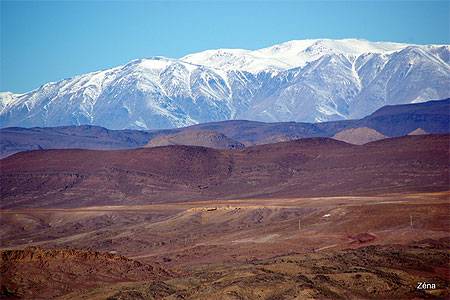
The Strait of Gibraltar and the 2 columns of Hercules.
Very recently, a French geologist, J. Collina-Girard, exploited the trail raised by Plato which explicitly writes that Atlantis is "in front of the Hercules columns" (Straits of Gibraltar). Its current configuration is the legacy of global warming following the last glaciation: water has risen 135 m in 15 000 years, submerging the continental shelves between 19 000 and 4 000 years BC. J.C.
Chance or coincidence?
A part of the landscape has disappeared under the sea. An island, 14 km long and 5 km wide, was discovered in the seabed northwest of Cape Spartel (in Tangier, Morocco), Less than 10 km from the coasts. It is probable that it was occupied by the Palaeolithic populations whose presence was attested on the Moroccan, Spanish and Portuguese coastlines. Geology thus proves that an island was engulfed at the time and place evoked by Plato. But does the geological reality refer to the truth set forth by the philosopher? Is this coincidence enough to prove the truth of the myth? J. Collina-Girard did not take a position.
Des Atlantes in the Atlas:...

Justify imperialism and the hierarchy between peoples
In the sixteenth century, Olof Rudbeck associated Atlantis with Sweden and obtained a legitimation of imperialism. In the nineteenth century, European settlers located Atlantis in Africa to justify their presence there. The myth continues today to be manipulated for racist purposes to justify a so-called hierarchy of peoples. In 1997, the extreme right-wing journals "New School" and "Indo-European Studies" focused on the Nordic origin of the Indo-Europeans evoked as conquerors from the North to control the rest of Europe.
The great missing cities:
The myth of Atlantis is one of the great mysteries of history. Other traditions and legends, from all cultures, evoke large cities or islands disappeared. None, however, has aroused as much fascination as Atlantis.
Avalon: According to Celtic legend, this misty island belonging to the Arthurian legend, would have disappeared from the surface of the Earth when Galahad would have found the Grail.
Ys: according to northern mythology, Dahut, princess of Cornwall, had a city built on the sea, protected from waves and storms by a bronze door. Out of love, she flew the key of the city to her father Gradlon and a huge wave engulfed Ys forever.
Lemuria: The theory of the "lost continent of Mu", supposedly to be found in the Indian Ocean, dates back to the nineteenth century. Darwinian scientists have hypothesized that a continent would one day link South India to Africa. Some see in Mu the original garden of Eden.
Source : Lintern@ute
Today we are going to look in more detail at the part where the columns of Hercules are ...
The revelation of the Strait of Gibraltar:
The 10,000-year date marks the end of the last glaciation that began 100,000 years ago. The maximum of the glaciation took place 22,000 years ago.
The pack ice of the North Pole was then largely in England. 12,000 years later, the date of Iberomaurusian burials, the glacial period will be over, and the sea level will have risen 135 meters in 10,000 years.

Last glacial period (- 110,000, - 10,000 BP)
At the initiative of A. Bouzouggar, the researcher who confirmed the kinship of the men of the Taforalt Cave with Homo sapiens, a French geologist studied the Strait of Gibraltar from the end of the Ice Age.
Spanish geologists have shown that no geological accident has occurred in this region over the past 20,000 years. The underwater relief has not changed for 20,000 years. Thanks to geological surveys in the Strait of Gibraltar, geologist Jacques Collina-Girard was able to reconstruct the profile of the Strait during the Ice Age.
It was enough to remove virtually 135 meters from the current level of the sea. It is then 7 islands that emerge in the strait.

In Beige are the emerged areas with a sea level lower than 135 meters.
The largest of these islands, the island of Cap Spartel, has an area of 70 km², spanning 14 km in length and 5 km in width. Its highest peak would then have peaked at 80 meters above sea level.
The myth of Atlantis reappears ...
Today, this summit is 56 meters below the level of the Atlantic Ocean. As Jacques Collina-Girard observes, these islands lie to the west of the columns of Heracles (for the Greeks) or columns of Hercules (for the Romans).
This study brings us back to the Atlantis Kingdom of mythology. Dominique Commelin (C.N.R.S.) recalls that the episode of the submersion of these islands dates back to 9,600 BC. Thus Herodotus, the fifth century BC, reported an event that occurred 9,000 years before him, in the form of a legend.
Plato, evoking the Kingdom of Atlantis, would have mingled real events with Berber mythology transmitted to Greek mythology.
That the people of Atlantis had a king named Atlas is very possible. In Greek mythology, Atlas is the eldest brother of 10 brothers called Atlantes, sons of Poseidon (God of the sea) and Clito. Moreover, Antaeus, a king of Libya (Berber), would also be the son of Poseidon (his mother would be Gaia, the Earth).
The idea that one finds the tomb of Antaeus in a mound in Morocco makes shudder. (Read the article: The Berbers would have discovered America?)
It is now known that the Iberomaurusians, the ancestors of the Berbers, occupied the Iberian coast and those of present-day Morocco towards the end of the last glaciation. This meant that they were able to cross the Strait of Gibraltar and occupy the islands there.
In this case, the Iberomaurusians would indeed be the people of Atlantis. And some of them would have lived under the reign of Atlas ...
After all, the Pharaohs of Egypt also considered themselves demi-gods. Ibn Khaldun attached the origin of the Berbers to Canaan, the grandson of Noah. Noah's Ark would have allowed his occupants to save themselves from the Deluge in the Bible. Would its occupants come from the island of Cap Spartel and the neighboring islands?
One question remains: Why should not a civilization as advanced as that of Atlantis have left convincing vestiges on the Spanish and Moroccan lands?
There are in Morocco the remains of Lixus (the temple of Antaeus) and its tomb on the megalithic site of M'Zora ...

What if the archaeological excavations under way in Morocco brought us new indications of the origin of the Berbers? Because the coastal areas of Morocco have been deeply explored and are beginning to reveal their secrets. This is precisely what the disappeared people lived.
The cave of Hercules is part of a set of caves on the Achakar site, at Cape Spartel, not far from Tangier. Archaeological excavations have revealed ceramics on 5 levels. They are continuing.
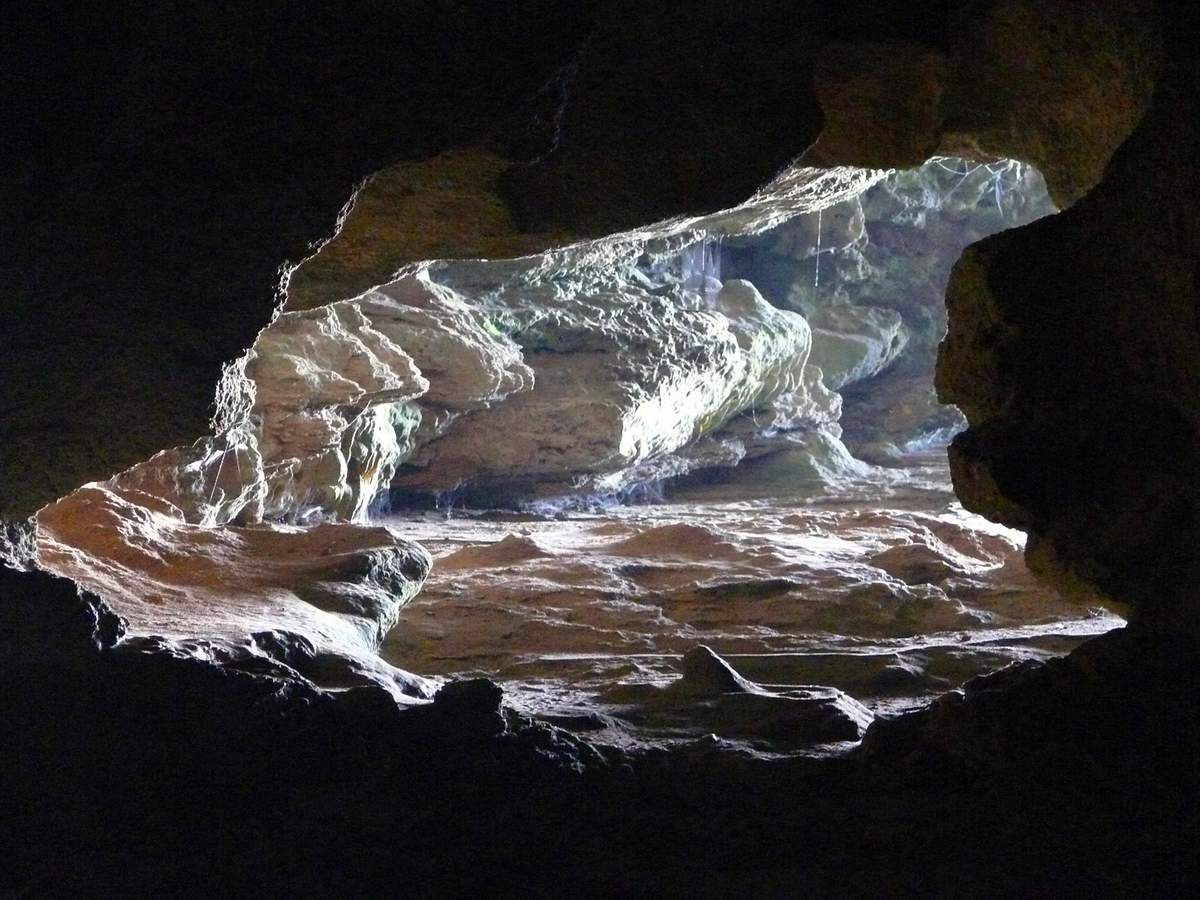
Plus d'infos encore sur le site : SOURCE
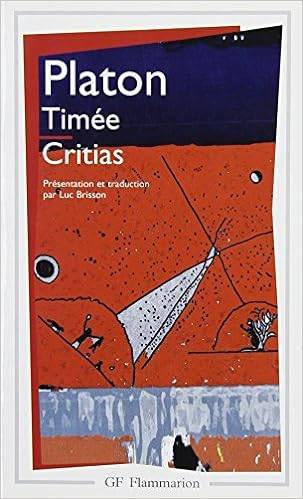
The information given by Plato in the Timaeus and the Critias are obviously the first to be taken into account. They are the ones who necessarily guide the whole quest.
The initial location of Atlantis is made in relation to the "passage", the "strait" known as "Hercules columns".
Since the earliest antiquity, the "columns of Hercules" are located at the place we call "Strait of Gibraltar". Even though some have imagined that there might have been other "Hercules columns" no tradition mentions any other than those we know.
The territory of the Atlantean Empire:
According to the Timaeus, Atlantis had constituted an immense empire which consisted of the following territories: on the one hand, its entire island, many other neighboring islands, as well as parts of the neighboring continent, On the other hand, from Libya to Egypt and from the western part of Europe.
An island close to a continent ...
"And the travelers of that time could pass from that island to the other islands, and from these islands they could reach the whole continent on the opposite shore of that sea which really deserved its name."
This precision makes it possible to understand clearly that the configuration is clearly explained: we find Atlantide Island, other islands not very far away, and finally the continent ... and this may matter whether we go south, or north, One falls either on the African continent or on the European continent.
One could therefore consider on reading all this that Atlantis is indeed located in the Mediterranean Sea!

The amazing story of an island swallowed up in front of the Strait of Gibraltar!
"But it's Atlantis!" "Exclaimed a provocative Jacques Collina-Girard at the sight of an underwater relief on a map of the Strait of Gibraltar. Thus begins an extraordinary inquiry which will lead him to retrace the history of a vanished world. That of an archipelago having sunk 12 000 years ago under the rise of the waters provoked by the melting of the ice. An earthquake and tsunami of exceptional magnitude would have completed its submersion.
Simple coincidence?
Plato's narrative on Atlantis, although supposedly imaginary, situates the scenario of this disappearance in the same place and at the same date, the author notes. Oral tradition from Egypt, which was written down for the first time by the Greek philosopher, would the myth of the island suddenly engulfed by the ocean conceal a background of truth?
Is it then possible that the memory of catastrophic events that occurred 12,000 years before us could have transpired for millennia?
Compare the antipodal point of the supposed place of the localization of Atlantis, and one falls on New Zealand ... And then?
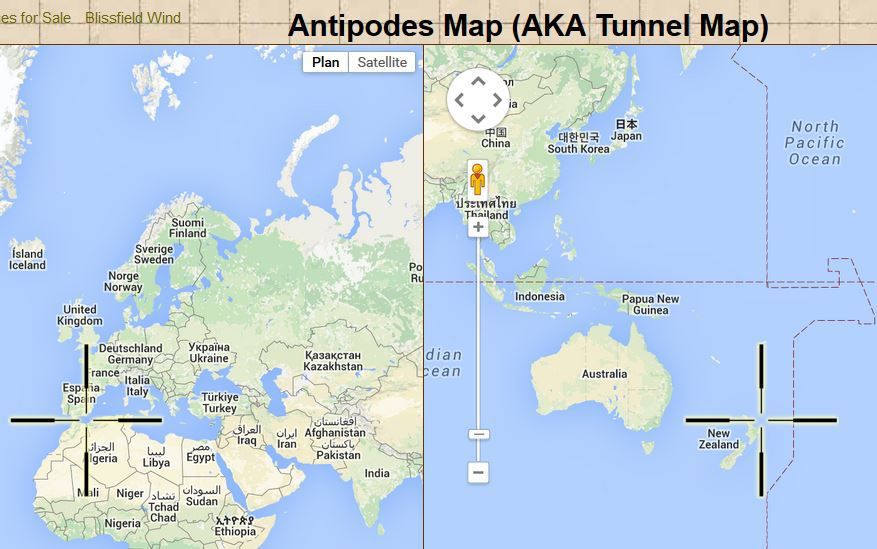
New Zealand style is very geographically isolated, and this isolation has allowed the development of a rich and varied endemic flora and fauna.
Atlantis was isolated geographically, and this isolation allowed the development of a race with very rich and varied technologies.
The history of this country (New Zealand) is one of the shortest in the world, because it is one of the last territories discovered by Man: indeed the Maori arrived there between 1050 and 13008, While the Europeans landed there in 1642.
The history of this country (Atlantis) is one of the oldest in the world, more than 12,000 years old, and it is one of the last territories discovered by Man: in 2015 Is not yet sure that this is actually Atlantis.
Atlantis was highly developed, and the human development index was expected to be very high. Thus, between 2008 and 2011, when the global economic situation was poor, New Zealand recorded a record increase in its human development index from 21st to 3rd place in the world rankings behind Norway and Australia .
The name New Zealand means "new land of the seas" versus "the ancient land of the seas" that represents Atlantis!
The South Island is the largest for New Zealand, as for Atlantis (island No. 7 on the map)
New Zealand is the last inhabitable land before reaching the Antarctic continent to the south, a continent that is mysterious, isolated, cold, and uninhabitable.
Whereas on the contrary, south of Atlantis is the continent that is recognized as the cradle of humanity, and hot.
New Zealand is part of a continent called Zealandia, 93% ... submerged. No need to say more with the report on Atlantis.

Atlantis finally found after 12 000 years ...?
Or is hiding, and where is Atlantis ...?
Not sharpening the debate, some scientists consider that Plato's account may be partially true. In the sixth century, Proclus interpreted the philosopher's text as a mixture of historical facts and philosophical allegory. He relied on a treatise on geography which confirmed Plato's version by demonstrating the existence of an archipelago off the columns of Hercules (the present Strait of Gibraltar).
Great expeditions.
Today, some specialists do not completely exclude this hypothesis: arguments in support, they envisage that there can be a real nucleus in the myth. Crossing texts and archaeological, geological and historical data, their calculations resulted in numerous expeditions: from the Atlas to the Strait of Gibraltar through the poles, the explorers sought Atlantis in the four corners of the world.
The main destinations ...
Atlantis has been the subject of speculation and research around the world, based on hypotheses more or less based, and six destinations have been privileged to try its location, see map above:
- The Antarctic South Pole: The Antarctic Ocean is the "real ocean" evoked by Plato.
- The region of the Nordic countries: The Atlanteans have been associated with the warrior peoples of northern Europe.
- The Atlantic Ocean: Atlantis would be a continent disappeared in the middle of the ocean.
- The Mediterranean, more particularly Cyprus and Crete
- The surroundings of the Strait of Gibraltar: Plato places Atlantis off the "columns of Hercules" (current Gibraltar).
- The North African Atlas: Generally sought after at the bottom of the sea, the Atlanteans were also assimilated to the inhabitants of the Libyan region.

Map drawn by Piri Reis in 1513
Two contemporary Canadian researchers, Rand and Rose Flem-Ath, place Atlantis in Antarctica. Based on the Piri Reis map, they found that looking at the globe from the South Pole, all the oceans seemed to belong to one and the same group, the "true ocean" evoked by Plato.
In the middle, center of the world, is the Antarctic, or possibly Atlantis. The Atlanteans, who would have anticipated the cataclysm, would have taken refuge on the lands at altitude, spared by the tidal wave: the Cordillera of the Andes, the plateaus of Thailand and Ethiopia.
Nordic Atlantis, a thesis oriented:
Strabo, a Greek geographer of the early Christian era, was the first to speak of a northern Atlantis: he established a link between the conquests of the northern peoples (Celts, Cimbres and Teutons who threatened the Greeks and Romans In the 6th century BC) and the Atlantean conquests.
At the beginning of the 20th century, the German pastor Jürgen Spanuth resumed his theories for racist purposes. According to him, the Celts and Germans, or "peoples of the North Sea", were none other than the descendants of the Atlanteans whom he called the "original people." He describes this civilization as closed, rooted in its native land and hermetic to external influences. These peoples whom he claims to be superior, according to him, are pure because they are not mixed.
Columbus discovers Atlantis:

Map of Atlantis in the middle of the Atlantic Ocean
In the fifteenth century, the discovery of America by Christopher Columbus launched the theory of an Atlantic Atlantis. In a text of 1525, the conquistador Ovidio maintains that Columbus discovered America by seeking, in the middle of the Atlantic Ocean, the Hesperides, a garden of delights sometimes associated with Atlantis.
The drift of the continent:
In the nineteenth century, it was the similarities between Egyptian and pre-Columbian societies which reiterated the hypothesis that a continent would have occupied virtually the entire Atlantic Ocean. In 1925, English Spence, which is based on the geological knowledge of the time, deepens this idea.
It shows that Atlantis would have dislocated with time and natural disasters. The drift of the continents would have divided it between the East (Africa) and the West (Central and South America). The Atlanteans then emigrated to these areas. Spence explains the resemblance between Egyptian and Andean architecture.
The return to the columns of Hercules.
Submersion of the Strait:

The Strait of Gibraltar and the 2 columns of Hercules.
Very recently, a French geologist, J. Collina-Girard, exploited the trail raised by Plato which explicitly writes that Atlantis is "in front of the Hercules columns" (Straits of Gibraltar). Its current configuration is the legacy of global warming following the last glaciation: water has risen 135 m in 15 000 years, submerging the continental shelves between 19 000 and 4 000 years BC. J.C.
Chance or coincidence?
A part of the landscape has disappeared under the sea. An island, 14 km long and 5 km wide, was discovered in the seabed northwest of Cape Spartel (in Tangier, Morocco), Less than 10 km from the coasts. It is probable that it was occupied by the Palaeolithic populations whose presence was attested on the Moroccan, Spanish and Portuguese coastlines. Geology thus proves that an island was engulfed at the time and place evoked by Plato. But does the geological reality refer to the truth set forth by the philosopher? Is this coincidence enough to prove the truth of the myth? J. Collina-Girard did not take a position.
Des Atlantes in the Atlas:

The Strait of Gibraltar and the 2 columns of Hercules.
Very recently, a French geologist, J. Collina-Girard, exploited the trail raised by Plato which explicitly writes that Atlantis is "in front of the Hercules columns" (Straits of Gibraltar). Its current configuration is the legacy of global warming following the last glaciation: water has risen 135 m in 15 000 years, submerging the continental shelves between 19 000 and 4 000 years BC. J.C.
Chance or coincidence?
A part of the landscape has disappeared under the sea. An island, 14 km long and 5 km wide, was discovered in the seabed northwest of Cape Spartel (in Tangier, Morocco), Less than 10 km from the coasts. It is probable that it was occupied by the Palaeolithic populations whose presence was attested on the Moroccan, Spanish and Portuguese coastlines. Geology thus proves that an island was engulfed at the time and place evoked by Plato. But does the geological reality refer to the truth set forth by the philosopher? Is this coincidence enough to prove the truth of the myth? J. Collina-Girard did not take a position.
Des Atlantes in the Atlas:...

Justify imperialism and the hierarchy between peoples
In the sixteenth century, Olof Rudbeck associated Atlantis with Sweden and obtained a legitimation of imperialism. In the nineteenth century, European settlers located Atlantis in Africa to justify their presence there. The myth continues today to be manipulated for racist purposes to justify a so-called hierarchy of peoples. In 1997, the extreme right-wing journals "New School" and "Indo-European Studies" focused on the Nordic origin of the Indo-Europeans evoked as conquerors from the North to control the rest of Europe.
The great missing cities:
The myth of Atlantis is one of the great mysteries of history. Other traditions and legends, from all cultures, evoke large cities or islands disappeared. None, however, has aroused as much fascination as Atlantis.
Avalon: According to Celtic legend, this misty island belonging to the Arthurian legend, would have disappeared from the surface of the Earth when Galahad would have found the Grail.
Ys: according to northern mythology, Dahut, princess of Cornwall, had a city built on the sea, protected from waves and storms by a bronze door. Out of love, she flew the key of the city to her father Gradlon and a huge wave engulfed Ys forever.
Lemuria: The theory of the "lost continent of Mu", supposedly to be found in the Indian Ocean, dates back to the nineteenth century. Darwinian scientists have hypothesized that a continent would one day link South India to Africa. Some see in Mu the original garden of Eden.
Source : Lintern@ute
Today we are going to look in more detail at the part where the columns of Hercules are ...
The revelation of the Strait of Gibraltar:
The 10,000-year date marks the end of the last glaciation that began 100,000 years ago. The maximum of the glaciation took place 22,000 years ago.
The pack ice of the North Pole was then largely in England. 12,000 years later, the date of Iberomaurusian burials, the glacial period will be over, and the sea level will have risen 135 meters in 10,000 years.

Last glacial period (- 110,000, - 10,000 BP)
At the initiative of A. Bouzouggar, the researcher who confirmed the kinship of the men of the Taforalt Cave with Homo sapiens, a French geologist studied the Strait of Gibraltar from the end of the Ice Age.
Spanish geologists have shown that no geological accident has occurred in this region over the past 20,000 years. The underwater relief has not changed for 20,000 years. Thanks to geological surveys in the Strait of Gibraltar, geologist Jacques Collina-Girard was able to reconstruct the profile of the Strait during the Ice Age.
It was enough to remove virtually 135 meters from the current level of the sea. It is then 7 islands that emerge in the strait.

In Beige are the emerged areas with a sea level lower than 135 meters.
The largest of these islands, the island of Cap Spartel, has an area of 70 km², spanning 14 km in length and 5 km in width. Its highest peak would then have peaked at 80 meters above sea level.
The myth of Atlantis reappears ...
Today, this summit is 56 meters below the level of the Atlantic Ocean. As Jacques Collina-Girard observes, these islands lie to the west of the columns of Heracles (for the Greeks) or columns of Hercules (for the Romans).
This study brings us back to the Atlantis Kingdom of mythology. Dominique Commelin (C.N.R.S.) recalls that the episode of the submersion of these islands dates back to 9,600 BC. Thus Herodotus, the fifth century BC, reported an event that occurred 9,000 years before him, in the form of a legend.
Plato, evoking the Kingdom of Atlantis, would have mingled real events with Berber mythology transmitted to Greek mythology.
That the people of Atlantis had a king named Atlas is very possible. In Greek mythology, Atlas is the eldest brother of 10 brothers called Atlantes, sons of Poseidon (God of the sea) and Clito. Moreover, Antaeus, a king of Libya (Berber), would also be the son of Poseidon (his mother would be Gaia, the Earth).
The idea that one finds the tomb of Antaeus in a mound in Morocco makes shudder. (Read the article: The Berbers would have discovered America?)
It is now known that the Iberomaurusians, the ancestors of the Berbers, occupied the Iberian coast and those of present-day Morocco towards the end of the last glaciation. This meant that they were able to cross the Strait of Gibraltar and occupy the islands there.
In this case, the Iberomaurusians would indeed be the people of Atlantis. And some of them would have lived under the reign of Atlas ...
After all, the Pharaohs of Egypt also considered themselves demi-gods. Ibn Khaldun attached the origin of the Berbers to Canaan, the grandson of Noah. Noah's Ark would have allowed his occupants to save themselves from the Deluge in the Bible. Would its occupants come from the island of Cap Spartel and the neighboring islands?
One question remains: Why should not a civilization as advanced as that of Atlantis have left convincing vestiges on the Spanish and Moroccan lands?
There are in Morocco the remains of Lixus (the temple of Antaeus) and its tomb on the megalithic site of M'Zora ...

What if the archaeological excavations under way in Morocco brought us new indications of the origin of the Berbers? Because the coastal areas of Morocco have been deeply explored and are beginning to reveal their secrets. This is precisely what the disappeared people lived.
The cave of Hercules is part of a set of caves on the Achakar site, at Cape Spartel, not far from Tangier. Archaeological excavations have revealed ceramics on 5 levels. They are continuing.

Plus d'infos encore sur le site : SOURCE

The information given by Plato in the Timaeus and the Critias are obviously the first to be taken into account. They are the ones who necessarily guide the whole quest.
The initial location of Atlantis is made in relation to the "passage", the "strait" known as "Hercules columns".
Since the earliest antiquity, the "columns of Hercules" are located at the place we call "Strait of Gibraltar". Even though some have imagined that there might have been other "Hercules columns" no tradition mentions any other than those we know.
The territory of the Atlantean Empire:
According to the Timaeus, Atlantis had constituted an immense empire which consisted of the following territories: on the one hand, its entire island, many other neighboring islands, as well as parts of the neighboring continent, On the other hand, from Libya to Egypt and from the western part of Europe.
An island close to a continent ...
"And the travelers of that time could pass from that island to the other islands, and from these islands they could reach the whole continent on the opposite shore of that sea which really deserved its name."
This precision makes it possible to understand clearly that the configuration is clearly explained: we find Atlantide Island, other islands not very far away, and finally the continent ... and this may matter whether we go south, or north, One falls either on the African continent or on the European continent.
One could therefore consider on reading all this that Atlantis is indeed located in the Mediterranean Sea!

The amazing story of an island swallowed up in front of the Strait of Gibraltar!
"But it's Atlantis!" "Exclaimed a provocative Jacques Collina-Girard at the sight of an underwater relief on a map of the Strait of Gibraltar. Thus begins an extraordinary inquiry which will lead him to retrace the history of a vanished world. That of an archipelago having sunk 12 000 years ago under the rise of the waters provoked by the melting of the ice. An earthquake and tsunami of exceptional magnitude would have completed its submersion.
Simple coincidence?
Plato's narrative on Atlantis, although supposedly imaginary, situates the scenario of this disappearance in the same place and at the same date, the author notes. Oral tradition from Egypt, which was written down for the first time by the Greek philosopher, would the myth of the island suddenly engulfed by the ocean conceal a background of truth?
Is it then possible that the memory of catastrophic events that occurred 12,000 years before us could have transpired for millennia?
Compare the antipodal point of the supposed place of the localization of Atlantis, and one falls on New Zealand ... And then?

New Zealand style is very geographically isolated, and this isolation has allowed the development of a rich and varied endemic flora and fauna.
Atlantis was isolated geographically, and this isolation allowed the development of a race with very rich and varied technologies.
The history of this country (New Zealand) is one of the shortest in the world, because it is one of the last territories discovered by Man: indeed the Maori arrived there between 1050 and 13008, While the Europeans landed there in 1642.
The history of this country (Atlantis) is one of the oldest in the world, more than 12,000 years old, and it is one of the last territories discovered by Man: in 2015 Is not yet sure that this is actually Atlantis.
Atlantis was highly developed, and the human development index was expected to be very high. Thus, between 2008 and 2011, when the global economic situation was poor, New Zealand recorded a record increase in its human development index from 21st to 3rd place in the world rankings behind Norway and Australia .
The name New Zealand means "new land of the seas" versus "the ancient land of the seas" that represents Atlantis!
The South Island is the largest for New Zealand, as for Atlantis (island No. 7 on the map)
New Zealand is the last inhabitable land before reaching the Antarctic continent to the south, a continent that is mysterious, isolated, cold, and uninhabitable.
Whereas on the contrary, south of Atlantis is the continent that is recognized as the cradle of humanity, and hot.
New Zealand is part of a continent called Zealandia, 93% ... submerged. No need to say more with the report on Atlantis.

